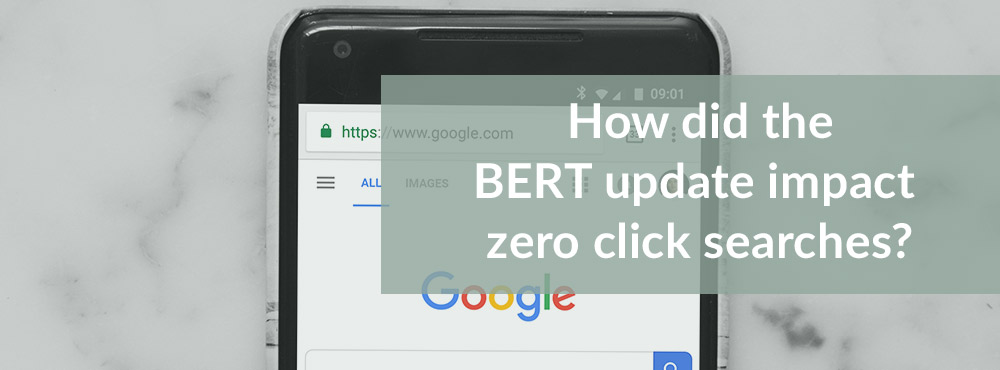We recently wrote an article that detailed Google’s BERT update and what that meant for content marketing.
You can ready that post in full *here*, but to bring you up to speed, I’ll summarise below, too.
BERT + a quick summary on informed and guided content strategies
The BERT update was hailed as one of the most important and impactful updates that has taken place over the past five years. The changes saw Google implement deep learning and natural language processing algorithms, meaning that it is making effort to interpret the entire query, rather than using phrase matching as it has done previously.
The result? Users are served up results and content that are relevant to the context of their search query. Although this is not going to be an algorithm that penalises sites, it does mean that businesses and marketing teams need to spend longer analysing search queries and search intent, creating content that is informative, relevant and valuable to the user.
This approach requires more thorough search research, more alignment between sales and marketing, and more content creation to meet buyers at each stage of their decision process.
The article also references the changes that BERT made to featured snippets. Featured snippets will also be more relevant and aligned with the user’s search. The example below has been provided from Google (for context!).
You can see that prior to BERT, Google was somewhat confused when it came to the information that was being required. They admit, “We placed too much importance on the word “curb” and ignored the word “no”, not understanding how critical that word was to appropriately respond to this query. So, we’d return results for parking on a hill with a curb.”

While, it can’t be denied that this is going to be of great benefit to users when it comes to finding relevant information quickly and easily, what does it mean for site traffic, and will it increase the volume of zero-click searches?
The rise of the zero-click search
To begin with, lets outline what a zero-click search is. When a user carries out a search on Google but doesn’t click on any of the website presents on the results page, this is counted as a zero-click search. There are a variety of reason why this may happen, but it’s highly like that the information in the SERPS such as featured snippets or question and answer boxes have given them the information they needed.
More recently, there has been much debate around Google moving from ‘search engine’ to ‘competitor’. Rand Fishkin (previously of Moz, now SparkTorro) has made no secret of the fact that the tech giant responsible for our traffic, leads and ultimately a proportion of our revenue and growth, is now a competitor.
This was happening way before BERT. Figures from last summer show that half of all Google searches end without a click because Google is serving up the answers in different, more convenient ways, including:
- Ads
- Google Shopping
- Google Jobs
- Rich Snippets
- Featured Snippets
- Answer/’People also ask’ boxes
- Knowledge Panels
In many cases (evidently 50% of cases), when provided with the above there is absolutely no need to click through for more information; it’s all served up, there and then, and has answered the user’s query.
Google is providing excellent user experience. And while our visibility takes a bit of a blow, ranking well AFTER these elements, the real hit we take is on site traffic.
… And brand equity.
… And revenue.
There will be a limit to this – although we can’t yet say what that limit is. Google has already been landed with some pretty hefty lawsuits for manipulating the Search Engine Results Pages (SERPs) in their favour.
Will zero-click searches increase after BERT?
In a word, yes; if an answer can be supplied to the user as a featured snippet or Q&A, then it will be.
BERT is designed to focus on answering long searches, and it has been confirmed by the tech firm that the number of featured snippets will increase to 25 languages.
The reason why some of us haven’t noticed much of a difference is because, historically, long-tail keywords aren’t tracked, so BERT’s impact isn’t visible.
SERP positions have fluctuated and will continue to do so as a result of BERT. Some results will cease to appear at all, with new contenders beginning to rank instead. This is because they will be recognised as the result that is aligned with the context of the searcher’s query.
How do we combat zero-click and align with BERT?
While firm solutions are yet to be widely discussed, what we can do right now is shift our approach from short-tail to long-tail keywords, to get true visibility of the impact.
Focus on traffic, conversions and revenue. Focus on using SEO in the acquisition of new customers (separating and analysing traffic and conversions from non-branded searches).
This means using long-tail searches and analysing user intent to create top-of-funnel content, alongside striving to build and optimise websites to drive conversions. From our perspective, BERT is aligned with the inbound methodology – a principle that Media Matters can help with.
To learn more about adopting an inbound marketing approach and taking a targeted approach to acquisition and conversion contact us today. Our expertise can help your company gain visibility in front of your audience at each stage of the buyer journey. Chat to us and discover the strategies you can put in place to align with BERT, drive traffic and convert users into happy paying customers.





